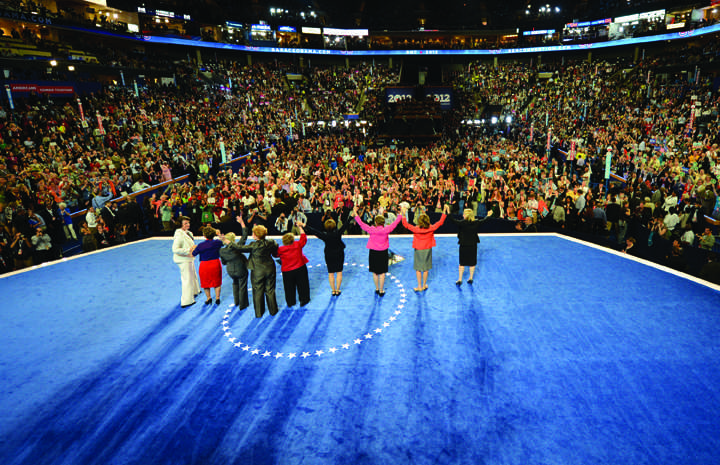Year of the Woman, Narrated by Man?
Coverage of Women’s Issues has been Unfairly Dominated by Male Journalists
September 19, 2012

It is no secret that the hot topics of the 2012 election have had a lot to do with women. From abortion to birth control, women’s reproductive rights have gained a significant role in candidate’s stump speeches. But with women’s rights in the spotlight, it doesn’t make sense that women themselves would be put on the back burner as men, yet again, take the stage. There’s something wrong with this picture.
Survey data released by The Women’s Media Center showed three-quarters of newspapers’ presidential coverage being written by men. In a study, horrifically named “SILENCED: Gender Gap in the 2012 Election” presented by 4thEstate.net, we see that the content is significantly biased as well.
When it came to the conversation about abortion, 81 percent of persons quoted in print media were men, seven percent were organizations and a wimpy 12 percent were women quoted. When conversations started about Planned Parenthood, women’s rights and birth control, the number of women quoted was slightly higher, but still tragically low, having percentages of 26 percent, 31 percent and 19 percent respectively. Furthermore, in front page articles covering the 2012 election that concerned topics concerning abortion or birth control, men were up to seven times more likely to be quoted than women were. This was true across the board for all major media outlets and publications. So what does this mean?
Women are significantly under-represented in the 2012 election coverage and in turn, are being repressed. 4thEstate.net suggests that “This gender gap undermines the media’s credibility,” because men are not a primary source for this information, and without a woman’s voice to act as a counterpoint, an effective argument cannot be had.
Now, I’m not saying that the coverage of women’s issues in the 2012 election should be all women, because that would be biased as well. If that were so, we would be getting all first-hand accounts, and arguments that ran the risk of being too personal or too emotion-driven rather than fact-driven. But regardless, the coverage should be equal or favoring women. It is 2012. As women, we can vote, earn the same pay as any man and hold the same positions in the workforce. We are equals, and we are more than ready to fight this “War on Women” ourselves, without a man taking the driver’s seat for us.
Because topics such as abortion and birth control are up for debate, the coverage in the media is generally made up of “subjective insight,” which really means that these men are sitting back and just voicing their opinions on women’s issues without actually doing research to back up their assertions. Abortion and birth control are something they don’t, and never can, fully understand. Unless they’ve experienced first-hand an unwanted pregnancy, the inability to afford birth control, or felt that their sexual health was being repressed, then they simply cannot have a strong, reliable voice on the topic.
As a woman today, I am offended by this media coverage, for more reasons than one. Growing up, I wasn’t too aware of the gender gaps around me. Most of my coherent life took place in the new millennium, and I never thought I would have to worry about inequalities because I am a girl. But as I get older, I realize that this is a war that is, sadly and tragically, still un-won. It may not be as big as voting rights, or the right to venture out into the workplace, or to live a life that doesn’t revolve around a husband and children, but it exists. It’s the little things, like not being heard in the media… on issues that primarily concern us.
Yes, there are men out there that sympathize with women in this debate, and think that we should have every right to do whatever we see fit regarding our bodies and our reproductive health. But there are also plenty of women who are pro-life, and don’t see it as a right being taken from us. These are women who see it as simply “right” and “wrong” in a very black and white sense of the world, when these issues are every shade of gray. Reproductive health and abortion are loaded issues, and we need to make space for all women’s voices, whichever their part of the spectrum, to be heard.
If I were a man, I would feel way out of my comfort zone writing about women’s issues, because it is not something I have lived and experienced. We, the women, are the primary sources for this information, and we should be used for that. Men do not tell our story the way it is actually happening, and that is no fault of their own. It is time for us to take the stage, and correctly present the information to the public for a well-informed debate. To put it simply, I quote the infamous Rachel Green: “No uterus, no opinion.”









